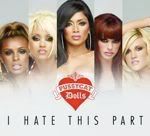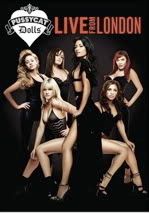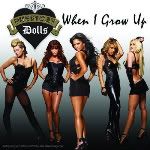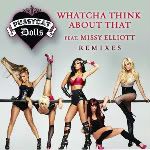-2cd-2008-front.jpg)
Credit to Sk8er at PCDWorld forums
Here are the reviews ratings:
The Times
The Los Angeles Times
Entertainment Weekly C+
Rolling Stone
The reviews:
The Times:
Pussycat Dolls: Doll Domination
Image-wise, the former burlesque dancers channel the Bratz dolls. But that doesn't stop the most innovative producers working with them, including Sean Garrett and Timbaland. The “space pop” sound of this record is similar to Britney Spears's Blackout, but unlike that tabloid-splattered masterwork, Doll Domination lacks any distinct personality. The exceptions include I Hate this Part, a break-up number on which Nicole Scherzinger is allowed to emote fully, and Whatcha Think About That?, which contains a cheeky rap from Missy Elliot.
The Los Angeles Times:
Pussycat Dolls "Doll Domination" (Geffen)
* 1/2
It's shaping up to be quite an autumn for American feminism. First, we have Republican vice presidential nominee Sarah Palin, about whom you might have read something in the last few weeks. Now the Pussycat Dolls, a burlesque troupe turned top-40 act, have made a collection of electro-pop songs that are the opposite of sex: belligerent come-ons and odes to singledom stripped of pleasure, adventure or anything resembling fun.
Both instances capture a particular moment in the woman-as-cultural-cipher debate, but at least Palin's nouveaux-"Fargo" accent doesn't come with a leather corset.
"When I Grow Up" is the album's first single and ideological centerpiece. Built off a filling-loosening house beat and the Dolls' smug cackling, it's so shameless in its celebration of the monoculture of moneyed youth that it transcends taste. It's more of a "95 Theses" as penned by Kim Kardashian and nailed to Viacom's front door with the shards of a broken BlackBerry -- we demand to be on TV; to drive nice cars; to have groupies.
There's nothing that comes within sniffing distance of "Don't Cha," the Cee-Lo penned bit of winking R&B that announced their presence to the world. Instead, "Doll Domination" is a series of signifiers to other, more interesting, moments in recent pop culture.
Especially after a summer when something as weird as "A Millie" or frothy as "American Boy" could rule the radio, the record seems less an album than a list of itemized expenses: a few grand for a twinkly piano ballad, a few more for the galloping Timbaland swipe and a few hundred to wash away the film of cynicism that coats everyone involved with "Doll Domination."
--August Brown
Entertainment Weekly:
There are two kinds of girl groups: those anchored by a superstar (the Supremes, Destiny's Child), and those made up of charismatic personalities
endowed with limited individual gifts (Spice Girls, TLC). The Pussycat Dolls are
neither — they're a brand, not a band. This follow-up to 2005's multiplatinum PCD finds lead Doll Nicole Scherzinger in the spotlight, and she's no Beyoncé. As for the others, well...can you name them? Do you even know how many there are? Still, the Dolls' formula occasionally works. Scherzinger's supple vocals are paired on Doll Domination with beats by A-list producers (Polow Da Don, Timbaland), resulting in a radio-friendly mix of vampy anthems, sultry midtempo grooves, and
sappy ballads. But 16 tracks is overkill (there's also a 22-song deluxe edition available), especially for a group that brazenly emphasizes style over substance. After a while, listening to this CD feels like a one-way conversation with a vapid hot chick who's in love with the sound of her own voice. C+
Rolling Stone:
Even with five members, the Pussycat Dolls apparently need a lot of help making records. The L.A. ladies' dance-pop-heavy second album boasts cameos from stars like Snoop Dogg and Missy Elliott, as well as beats and melodies by big-name producers and co-writers like Rodney Jerkins and Polow Da Don. Some guests were worth the money: R. Kelly mixes sweet and sassy on the catchy slow jam "Out of the Club," which sets a plush beat against a romantic chorus and a hook from Fergie's "Glamorous": "If you ain't got no money, take your broke ass home." And Timbaland offers the album's best beats, including a jazzy, mildly strange two-step on "In Person."
But too often, the Dolls offer nothing that gives their own group a definitive personality. Standard-issue diva lyrics – mostly about their excellent hairstyles and less-than-excellent exes — don't help. And tracks like "When I Grow Up" — a middle-of-the-road disco jaunt about wanting to be famous — sound like someone took several recent female-sung hits, added water and stirred into a fine, gray paste. With 15 cuts in all, the album sounds like the Dolls just threw everything they had against the charts to see if anything would stick.
18 September 2008
Doll Domination: Reviews
Subscribe to:
Post Comments (Atom)





















No comments:
Post a Comment